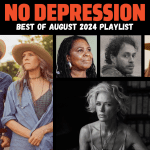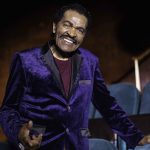Leo “Bud” Welch: A Long Journey
Every so often I’ll stumble across a story that is so note-perfect, so finely wrought, that my cynical side, the suspicious dimension of my nature is engaged. And since the arts are often home to some serious myth-making, when such stores concern musicians, I am doubly skeptical. But on the rarest of occasions, stories such as these are in fact true. The real deals do still exist: people with stories worthy of a Hollywood treatment are out there, waiting to be discovered.
So it is with Leo “Bud” Welch, and 81-year old gospel blues singer/guitarist from Bruce MS, an unincorporated town in Calhoun County. That county’s population has remained essentially the same size since 1890, though it did enjoy a brief boom in the 1940s. The nearest Interstate highway (I-55) is nearly 20 miles West, and the nearest city of significant size – Elvis‘ hometown of Tupelo – lies about 30 miles Northeast of the county.
Point is, Welch is from a region that’s near about as remote and rural as one can get in 21st century America. And here I’ll take a moment to quote verbatim from the press kit accompanies my copy of his new album, Sabougla Voices (more on which, presently)…
The phone rings at the Oxford, Miss.-based label Big Legal Mess. An intern tells the caller, “Oh, we don’t really do blues here anymore.” One of the company’s principals overhears this and grabs the phone. On the other end of the line is [Welch]. He’d heard about the label that brought you Junior Kimbrough’s First Recordings, Jack Oblivian, Reverend John Wilkins, Water Lairs and Bishop Manning and the Manning Family, and he wanted to know if there’d be interest in recording his debut album of downhome gospel and blues.
See? It really does read like the opening scene of a movie, right before we go to flashback.
And that flashback would run through Welch’s life, quickly hitting the high and relevant points in montage fashion: born in 1932; a young Leo learning guitar; a missed opportunity to audition for B.B. King; forming a gospel group called Leo Welch & the Rising Souls. And throughout the montage, viewers would hear the strains of Welch’s music.
The thing about his music is that it truly straddles the line between gospel and blues. On first listen, in fact, I heard it strictly as a blues collection: electric guitar and deeply soulful voice, backed by a no-nonsense lineup with little filigree (and fewer guitar solos). But as I listened more closely – the album richly rewards repeat listening – the gospel flavorings revealed themselves to the point at which they were so obvious, I wondered how I could have initially missed them.
First there’s the vocal choruses that back Welch up on many of the tunes. Not to traffic unnecessarily in cliché, but it requires no effort to imagine chorus-robed singers swaying and clapping in the background behind Welch and his sidemen. And then there’s the unmistakable lyrical focus of the songs. The titles tell the story: “Praise His Name,” “Take Care of Me Lord,” “Somebody Touched Me,” “His Holy Name.” You get the idea. But back to that bluesy first impression for a moment: the songs and arrangements are so strong, so heartfelt, that Sabougla Voices doesn’t require the listener to adhere to Welch’s set of religious views. It’s simply good music.

I ask him about the musicians accompanying him on Sabougla Voices. “That’s Jimbo Mathus backin’ me up” on some tracks, he says, though Welch plays guitar throughout the album. Mostly he’s on electric, but occasionally – as on “Mother Loves Her Children” and “A Long Journey” – it’s just Leo and drummer Andrew Bryant. Perhaps foolishly, I ask him what kind of guitar he plays on the album. “Mostly electric. But on the solo songs, I got a country guitar. You know: with a hole in the middle, and the sound comes out of that hole.”
Surprisingly – and perhaps counterintuitively for an album of this style – Sabougla Voices is not one of those old-fashioned, “everybody lays down their parts together at once” kinds of records. “I did my part of it first,” Welch explains, “And then they [producer Bruce Watson et. al.] put it together.” But the organic results delightfully belie that modern approach. And asked to explain his mixing of gospel and traditional blues, he says only, “That’s how I do it. That’s how I do my music. I don’t know what you call it; I call it praising His name.”
Leo Welch’s approach bears some similarities to the pioneering work of Sister Rosetta Tharpe; her synthesis of blues and gospel – not to mention her electric guitar work – was pioneering and forward-looking. Welch admits a fondness for Tharpe’s work, and the song he cites – a late 1940s cover of Mahalia Jackson‘s “Move On Up a Little Higher” – displays that hybrid gospel/blues sound.
Since Welch waited eighty-plus years to become an overnight sensation (He was the subject of a profile on NPR earlier this month), I ask if the songs on Sabougla Voices are tunes he’s carried with him for ages. Yes and no, he explains. “Some of them have been mine for two, three years. One of ‘em – ‘Praying Time’ – has been mine since Nineteen and Ninety-nine.” He sums up his overall approach by citing the track “His Holy Name.” “I keep on singing His holy name,” Bud Welch says, “so my singing won’t be in vain.”
Welch says he’s been performing since 1945, and he tells me he has “eleven gigs” lined up in Minnesota, followed by a tour of Europe and the UK. In late January 2014 he performed in Memphis, and he has dates scheduled in Mississippi and in Nashville into February. Many more concert dates are in the planning stages.
————————————————–
About Bill Kopp / Musoscribe
Depending on one’s interest, one is either amazed and entertained or bored to tears with Bill Kopp’s encyclopedic knowledge of the popular music of the last fifty years. A rock/pop music historian, he has amassed a collection of way more than 6,000+ albums, nearly half of those on vinyl. Bill has written for the now-defunct Skope (where he ran things as Editor-in-Chief for two years), Billboard, No Depression, Trouser Press, Ugly Things, WNC Magazine, Mountain Xpress, The Laurel of Asheville, Shindig! Magazine, 60sgaragebands.com and Jambase.org, among others.
Bill has interviewed and written features on artists including Chris Squire (Yes), The Psychedelic Furs, Bill Wyman, Todd Rundgren, The Flaming Lips, Ray Manzarek (Doors), R. Stevie Moore, Harry Shearer, Nick Lowe, Van Duren, George Thorogood, Ozric Tentacles, Steve Hackett (Genesis), Tommy James, John Wetton (UK, Asia, King Crimson), Larry Coryell, Felix Cavaliere (Rascals), Akron/Family, Paul Revere & the Raiders, The Moody Blues, Gary Wright, Greg Lake (Emerson, Lake & Palmer), Martin Newell (Cleaners From Venus), Bootsy Collins, Ann Wilson (Heart), Kim Wilson (Fabulous Thunderbirds), Ian Anderson (Jethro Tull), Henry Rollins, Yoko Ono, Ian McLagan (Small Faces), Kenney Jones (Small Faces / The Who), Van Dyke Parks, Richard Barone, Jason Falkner, Rose Windows, Tony Levin, Mitch Ryder, Steve Cropper (Booker T & the MGs), Crowded House, Camper Van Beethoven, Project/Object, The Church, Jack Casady, Trey Gunn, Porcupine Tree, The Turtles, Howard Jones, Creedence Clearwater Revisited, The Fleshtones, KT Tunstall, Andy Partridge, Terry Adams (NRBQ), Carmine Appice, The Black Angels, Robyn Hitchcock, Roky Erickson, Gentle Giant, Richard Barone, Adrian Belew, The Polyphonic Spree, Shoes, Zoé, Thrice, Pat Mastelotto, Steve Wynn, Nik Turner, Fall Out Boy, Dungen, Richie Havens, Sean Lennon, Bigelf, Pete Yorn, The Residents, Los Straitjackets, Radio Birdman, Veruca Salt, Richard X Heyman, Tommy Keene, Black Mountain, Marshall Crenshaw, Bob Moog, The Veronicas, The New York Dolls, Johnny Winter, Thijs van Leer (Focus), Roger Manning (Jellyfish), The Waterboys’ Mike Scott, Jeremy Spencer (Peter Green’s Fleetwood Mac), John McLaughlin, The Fuzztones, George Thorogood, Randall Bramblett, Rose Windows, Opeth, Bobby Rush, Thijs van Leer (Focus), Doug “Cosmo” Clifford (CCR), Southern Culture on the Skids, The Orange Peels, and many others. He’s reported on the Bonnaroo, Moogfest, Hopscotch, YepRoc 15, Dig!, Ponderosa Stomp, Americana Music Association, Mountain Oasis and Echo Project festivals, and written about consumer products including the Microsoft Zune, Rock Band: The Game and many others.
He’s currently working on a couple of book proposals (music-related, of course). He lives in a century-old house in Asheville, NC with his vintage motorcycle and way, way, way too many synthesizers.




